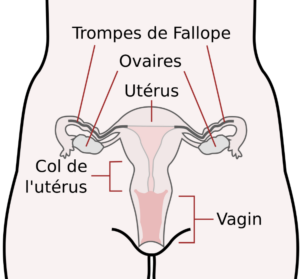Please read the previous part about infertility.
Lire la partie précédente sur l’infertilité.
There are different elements that a doctor must consider when evaluating why some couples are having difficulty conceiving. They will look at these dimensions to determine the cause of infertility. In this article, I talk about different factors, including age, genetics, anatomy, immune system, hormones, lifestyle and the environment. I will go through each below.
Age
We know that a woman’s egg reserve diminishes with age. Statistics show that today women are often having babies after 30, so this reality can explain, at least in part, the growing problem of couples and infertility. Some statistics show that a 30-year-old woman only has 12% of her reserves, and a 40-year-old, only 3%.
Age affects not only the number of eggs, but also their viability.
Genetic Factors
During the conception process, the fertilised egg can have chromosomic malformations, problems or be defective. The body will reject it, causing a miscarriage.
S’en suit un rejet du corps provoquant une fausse couche ou un avortement spontané si vous préférez.
We think 33% of implanted embryos will be eliminated before the 10th week of pregnancy. Based on the articles I read, 50-60% of miscarriages are attributable to chromosomic errors, a genetic defect that is not hereditary.
5% of women can experience two miscarriages in their lives, and only 1% three, but whatever the number of miscarriages, it can create a sense of worry and concern, as often the cause goes unexplained.
Anatomical Factors
Earlier I talked about the importance of anatomical structures for both men and women. They have to be healthy to promote reproduction. The organs need to function correctly. For women, this encourages the release of eggs, and for men, a higher sperm count. Both are the basis for reproduction.
For the woman, the released, healthy egg is a good start, but they also need healthy fallopian tubes and a uterus for the essential next steps. Defects in the uterus, fallopian tubes, and ovaries can interfere with reproduction.
The follicle found on the ovary must be healthy, as it will release a healthy egg so that the fallopian tube fringe can catch it and guide it towards its canal to welcome the first sperm that can penetrate its very resistant layer to fertilise it successfully. For about four days, the egg needs to travel towards the uterus to implant itself in the endometrium. The endometrium, which is the first very vascularised layer inside the uterus, will allow for the formation of the placenta and the structures necessary for the viability and development of the embryo.
In 2-4% of women, the fertilised egg, unfortunately, implants itself in the fallopian tube, leading to an extrauterine pregnancy called an ectopic pregnancy. Unfortunately, this cannot lead to a continuation of the pregnancy.
Chez 2 à 4 % des femmes, l’oeuf fécondé s’implante malencontreusement dans la trompe, provoquant une grossesse extra-utérine appelée grossesse ectopique. Cet état ne peut malheureusement pas avoir une issue favorable à la continuité de la grossesse.
Even if the embryo arrives safely and nests in the uterus as expected, 1/6 embryos will not develop, and a miscarriage will occur naturally in women under 35. After 35, this will happen in 25% of pregnancies, and over 40, 50%.
Men also need healthy structures to produce a high quantity of healthy, mobile sperm, and the ability to ejaculate them to allow them to meet the egg to fertilise it.
Immune System Factors
We don’t always know why some organisms will strongly react to agents leading to a significant defence reaction. This is called an autoimmune response, meaning that the body is fighting against something inside it, even its own body.
After different studies, fertility specialists can identify immune responses that can impact cells and thwart the process necessary for reproduction.
By identifying these different reactions, some actions can be taken to improve their situation and help fertility.
Hormonal Factors
Without a doubt, if your reproductive hormones are not working, you won’t be fertile.
Hormones are essential for starting the fertility stages, and their influence is significant. These chemical messengers will, each in their own way in a specific sequence, play a role in promoting fertilisation. That is why their presence and impact is so significant.
Lifestyle Factors
Healthy Weight
Weight can help with fertility. In cases where the body-mass index (BMI) is above 30 (obese), there are three times the risk of infertility for women, since fat creates estrogen which can play a secondary contraceptive role, even if you don’t want it to.
Paradoxically, women who have a BMI under 19 (considered underweight), it will also influence fertility, but more at the hormonal level. It may also cause irregular menstrual cycles or the absence of them, which does not help reproduction.
Male obesity also seems to have an impact on their fertility, as it has been shown that it can lead to changes in testosterone secretions. Since testosterone is essential for reproduction, male obesity can influence their ability to reproduce.
Tobacco
Tobacco is one of the worst factors that influence fertility, both for men and women. Cigarettes, which include nicotine, tar and other chemical components, play a negative role in reproduction. Health professionals will always promote abstinence to increase the couple’s chance of fulfilling their dream of having a baby.
Tobacco can influence a woman’s body by reducing the number of ovarian follicles required for ovulation. It also reduces the egg’s quality, which leads to an increase in ectopic pregnancies and a higher number of miscarriages. Tobacco increases the risk of infertility by 60%.
Tobacco also impacts men, as they will have a smaller sperm count. The chemical components in cigarettes can also have a genetic impact, baggage transmitted to the future baby.
Alcohol
Alcohol abuse can harm fertility.
For males, consuming five glasses a day reduces their sperm count and mobility and increases the risk of testicular cancer, reducing their ability to reproduce.
Cannabis
Even if used recreationally, marijuana can have a long term impact on fertility as it is eliminated from the body very slowly. Its effect is similar to alcohol, but the use of hard drugs such a cocaine, ecstasy and heroine where the reactions are even worse. In addition to impacting the quality of sperm, it can change morphology by creating abnormal cells during reproduction.
Même pris de façon récréative, le cannabis peut aussi agir à long terme sur la fertilité puisqu’il s’élimine très lentement.
Caffeine
Caffeine is also a factor because if a person drinks five caffeine-based products per day, it can harm their ability to reproduce.
Diet
This can also impact fertility. Eating “bad” fats, sugar and empty calories do not help when conceiving a baby. Blood sugar stability helps women’s fertility. Dietary imbalances, including some deficiencies, can cause hormonal disbalances that negatively influence the reproductive process.
Over-Exercising
This can impact ovulation or change menstrual cycles since hormones involved in fertilisation are disrupted if women exercise too much. Hormones are fragile, so too much exercise is like too little, it’s not better!
Environmental Factors
Modern industrialisation has brought many changes. Chemicals in the air, food, the things we are exposed to every day. These can harm the body.
Repeated contact with strong toxic products, depending on your profession or leisure activities, can lower fertility by reducing the number of sperm and disturbing hormones associated with menstrual cycles.
A man who wears very tight pants can overheat their testicles and potentially reduce sperm mobility.
Psychological Factors
High and chronic stress and anxiety can influence the ovulation process in women. Strong emotions can alter the menstrual cycle, so psychology can have an impact physically and on reproduction.
Based on the potentially harmful factors for fertility listed above, you may be wondering, “What should I do to make sure I have the best chance of having a baby?”
Here is some basic health advice from a fertility expert you can use to help your cause.
Continue reading with Expert Health Advice to Help Female and Male Fertility.
La suite : Conseils de pro pour aider la fertilité pour les femmes et les hommes.





